South African President Cyril Ramaphosa announced Thursday that Argentina, Egypt, Ethiopia, Iran, Saudi Arabia and the United Arab Emirates have joined the group of the so-called emerging BRICS economies (Brazil, Russia, India, China and South Africa). Africa).South).
“We have decided to invite the Argentine Republic, the Arab Republic of Egypt, the Federal Republic of Ethiopia, the Islamic Republic of Iran, the Kingdom of Saudi Arabia, and the United Arab Emirates, as full members, as of January 1, 2024.” he announced.
The South African leader was speaking at a joint press conference, in Sandton, on the results of the deliberations of the 15th BRICS Heads of State and Government summit, which concluded on Thursday, in Johannesburg, South Africa.
Ramaphosa said the BRICS leaders adopted the “Johannesburg II” Declaration of the 15th BRICS Summit.
The bloc currently accounts for more than 42% of global production and is expected to transform the global economy by 2030, being Africa’s largest trading partner. Despite not wanting to compete with the G7, as stated by Brazilian President Luiz Inácio Lula da Silva, the BRICS group intends to gain a more significant voice at the international level.
Over the past two days, leaders of the five countries have engaged in talks on various topics, including enhancing cooperation in security, energy, trade and economic and social issues.
Russia, also part of the bloc, was represented by Foreign Minister Sergey Lavrov. Taking into account the international arrest warrant issued against Russian President Vladimir Putin.
About 1,500 business leaders from different countries participated in the bloc’s business forum, according to the South African president.
Speaking at the summit, UN Secretary-General Antonio Guterres said a new multipolar order was now being implemented, with Russia’s invasion of Ukraine becoming a factor in the “divisions” and “tensions” between the countries.
Guterres spoke of different views on global crises, different approaches to non-traditional security threats, different strategies regarding new technologies, and of course the consequences of COVID-19 and Russia’s invasion of Ukraine.
Noting that this is “a moment to unite and work together”, what we see is that “the divisions are increasing and the tensions are increasing”, warning, before saying: “I continue to be deeply concerned about the risk of a rupture of the world order”. We are entering a multipolar world.
The Secretary-General of the United Nations stressed that “our world is in a difficult situation,” noting that humanity faces “existential challenges” ranging from the exacerbation of the climate emergency and the escalation of conflicts to the global crisis in the cost of living, to the increase in inequality. and massive technological disruptions.

“Hardcore alcohol maven. Hipster-friendly analyst. Introvert. Devoted social media advocate.”


